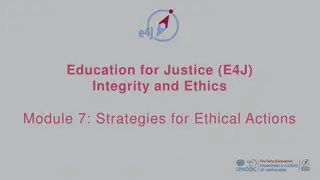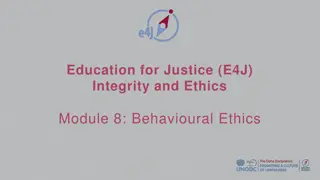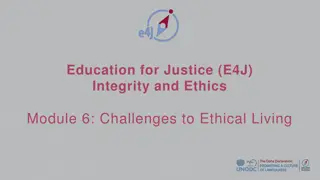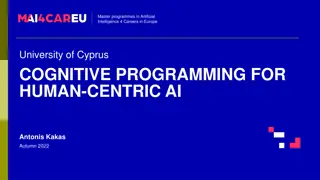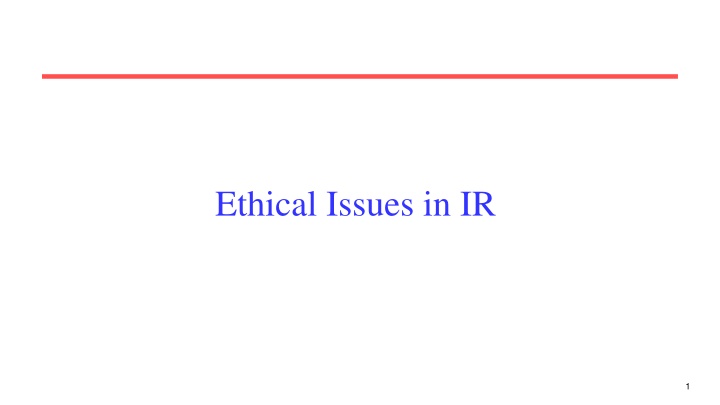
Uncovering Ethical Dilemmas in Information Retrieval Technology
Explore the ethical implications of IR technology, including issues like privacy, fairness, disinformation, internet addiction, filter bubbles, and radicalization. Recent documentaries delve into the human impact of social networking, Cambridge Analytical's influence on elections, and social media's role in cancel culture. Discover the privacy concerns with data collection by search engines and social media platforms, as well as the risks of deanonymization and approaches like randomized response for accurate statistics while safeguarding privacy.
Download Presentation

Please find below an Image/Link to download the presentation.
The content on the website is provided AS IS for your information and personal use only. It may not be sold, licensed, or shared on other websites without obtaining consent from the author. If you encounter any issues during the download, it is possible that the publisher has removed the file from their server.
You are allowed to download the files provided on this website for personal or commercial use, subject to the condition that they are used lawfully. All files are the property of their respective owners.
The content on the website is provided AS IS for your information and personal use only. It may not be sold, licensed, or shared on other websites without obtaining consent from the author.
E N D
Presentation Transcript
Ethical Issues IR technology raises a wide variety of ethical issues Privacy Fairness Disinformation Internet addiction Filter bubble Radicalization 2
Recent Documentaries Explores the dangerous human impact of social networking, with tech experts sounding the alarm on their own creations. Explores the Cambridge Analytical company that mined data from Facebook to impact the Brexit and 2016 Presidential elections. 3
Recent Documentaries Explores how social media has exacerbated issues with cancel culture 4
Privacy Search engines, social media sites, etc. collect enormous amounts of person information about their users. Data is sold to advertisers in various forms to allow micro targeting. Very few people read terms of use or change privacy settings from defaults. Some sites like DuckDuckGo do not collect user data nor personalize results. 7
Deanonymization Even if user IDs are removed, they can frequently be inferred from other disclosed information. In mid-90 s Mass. released anonymized data on state employee health records, and MIT PhD student identified the governor s unique record by combining info on birthday, sex, and zip code. When AOL released search query records in 2006 for anonymized users, specific users were identified thru information in their queries. Netflix Prize data was deanonymized in 2006 by UTCS researchers by matching ratings vectors with public film ratings on IMDB (Narayanan, Arvind; Shmatikov, Vitaly How To Break Anonymity of the Netflix Prize Dataset ) 8
Randomized Response Goal is to produce accurate population statistics without compromising privacy of individuals. Example: Ask a man whether he has ever had sex with a prostitute. Before he answers, ask him to flip a coin. Instruct him to answer "yes" if the coin comes up tails, and truthfully, if it comes up heads. Half of people will answer "yes" regardless of whether they have done it. The other half will answer truthfully. Whatever proportion of the group said "no", the true number who did not have sex with a prostitute is double that, because of the law of large numbers we assume the two halves are probably close to the same as it is a large randomized sampling. 9
Differential Privacy Add random noise to any computation from private data to ensure that no individual s data can be reverse engineered from the result. Ensure that when using released information the probability of any conclusion about any individual does not change much if their data is removed from the original dataset. Even if Bob s data was not included in the Netflix data we could still use the data to infer that if he watched Star Wars Episode II he probably watched Episode I. But we could not use it to accurately infer that he probably watched a pornographic film. If we do release info that allows us to infer this otherwise uninferable fact, we violate differential privacy. 10
Fairness Search results or recommendations could exhibit various types of bias, such as political or cultural bias. A search for a politically sensitive topic such as abortion or gay marriage could present results all from a particular perspective. Including come sort of diversity component to the ranking score could be useful to ensure that each subsequent result is significantly different from previous results. How do we measure fairness and how can algorithms prevent inadvertent biases? 11
Fairness in Machine Learning Systems Many machine learning systems exhibit inadvertent biases based on unrepresentative training data. Face recognition systems have a higher error rate for black individuals because training data did not contain a representative fraction of black faces. Mechanisms for statistically guaranteeing similar test error rates on particular protected classes such as sex, race, religion, and national origin. 12
Disinformation The Internet contains a wide variety of information, some of which is just inaccurate and unsupported by reliable facts, and some is intentional misinformation intended to mislead people for political or other purposes. How can we automatically detect fake news and fairly filter it or annotate it with reliable warnings. Given human-expert labeled training data, could use text categorization to detect some types of misinformation. Might detect know types of misinformation represented in the training data such as vaccines cause autism or ones that use exaggerated expressions. Hard to detect novel forms of misinformation such as those analyzed by fact checking organizations such as PolitiFact and Snopes. 13
Section 230 of the Communications Decency Act Provides immunity from liability for providers and users of an "interactive computer service" who publish information provided by third-party users: No provider or user of an interactive computer service shall be treated as the publisher or speaker of any information provided by another information content provider. But when recommendation algorithms push certain sites that attract attention (and fake news tends to attract attention), aren t they behaving more like publishers who should be held responsible for the material they promote? 14
Fake Review Detection One form of deception detection that has been widely studied is classifying product/hotel/etc. reviews as real or fake. Hard to get labelled data, some studies use solicited crowdsourced fake reviews. Automated text classification does fairly well at identifying fake reviews by finding linguistic patterns in fake and real reviews, fake reviews tend to be very general and abstract and real ones mention very specific, concrete details. 15
Internet Addiction Effective search and recommendation methods encourage continued engagement and screen time and can lead to addictive behavior. Machine learning over massive user data is used to optimize every aspect of information systems to maximize continued use. Internet companies use A/B testing to optimize every aspect of information systems to maximize engagement. 16
Filter Bubble Recommendation algorithms and personalized search and newsfeeds reinforce individual biases. Users become separated from information that disagrees with their viewpoints, effectively isolating them in their own cultural or ideological bubbles. Bill Gates 2017: (Technology such as social media) lets you go off with like-minded people, so you're not mixing and sharing and understanding other points of view ... It's super important. It's turned out to be more of a problem than I, or many others, would have expected. Algorithms that encourage presentation of a more diverse set of information might help to battle this effect. 17
Radicalization Extreme political/religious beliefs can be reinforced by recommendation and personalization. Can lead to self radicalization and potentially violent behavior. Pizza gate conspiracy (predecessor to QAnon) led to Edgar Maddison Welch, a 28-year-old man from Salisbury, North Carolina, on December 4, 2016 going to Comet Ping Pong and firing three shots from an AR-15 style rifle. 18












